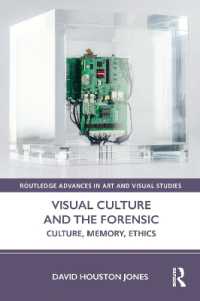- ホーム
- > 洋書
- > 英文書
- > Literary Criticism
Full Description
Hamlet's Moment identifies a turning point in the history of English drama and early modern political culture: the moment when the business of politics became a matter of dramatic representation. Drama turned from open, military conflict to diplomacy and court policy, from the public contestation of power to the technologies of government. Tragedies of state turned into tragedies of state servants, inviting the public to consider politics as a profession-to imagine what it meant to have a political career.
By staging intelligence derived from diplomatic sources, and by inflecting the action and discourse of their plays with a Machiavellian style of political analysis, playwrights such as Shakespeare, Jonson, Chapman, and Marston transformed political knowledge into a more broadly useful type of cultural capital, something even people without political agency could deploy in conversation and use in claiming social distinction. In Hamlet's moment, the public stage created the political competence that enabled the rise of the modern public sphere.
Contents
Introduction: Hamlet's Moment
Part I: Hamlet and the Profession of Politics
1: 'The Wiser Sort': The Distinction of Politics and Gabriel Harvey's Machiavellian Hamlet
2: Some Travellers Return: Diplomatic Writing, Political Careers, and the World of Hamlet
3: 'I Lack Advancement': Political Agents and Political Servants in Hamlet's Moment
Part II: Political Knowledge and the Public Stage in Hamlet's Moment
4: 'Vile and Vulgar Admirations': Chapman and the Public of Political News
5: 'The Most Matter with Best Conceyt': The Publics of Tacitean Observation and the Margins of Politics in Jonson's Sejanus
6: 'For Discourse's Sake Merely': Political Conversation on the Stage and Off
Bibliography








